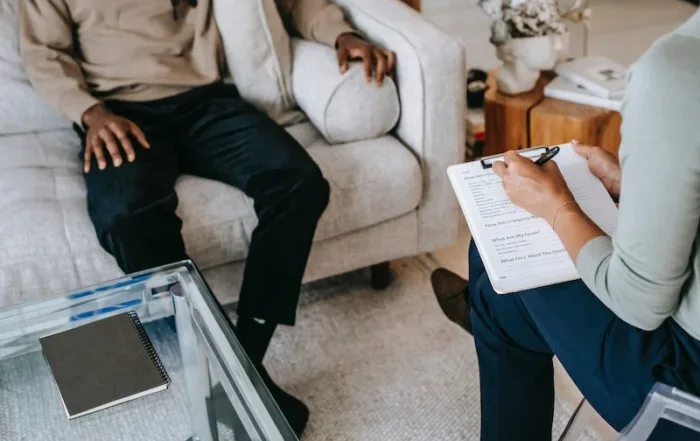
Mental health is just as important as physical health, yet it’s often overlooked in our busy lives. Many people wait until they feel completely overwhelmed before they start taking care of their mental well-being. The good news is that self-care doesn’t always require expensive therapy sessions, spa retreats, or complicated routines. You can start right at home with simple, practical habits that support your mind, emotions, and overall balance.
In this article, we’ll explore easy mental health self-care practices at home that anyone can do, even with a busy schedule. These practices are small steps, but when done consistently, they can make a big difference in how you feel every day.
1. Create a Morning Routine That Sets the Tone
How you start your day has a powerful impact on your mood and energy. Instead of rushing to your phone or jumping straight into tasks, take a few minutes in the morning for yourself.
Ideas for a simple morning routine:
- Stretch for 5 minutes to wake up your body.
- Drink a glass of water before coffee.
- Practice deep breathing or short meditation.
- Write down one positive intention for the day.
This gentle start reduces stress and prepares your mind to face challenges calmly.
2. Practice Deep Breathing Exercises
Breathing is something we do automatically, but mindful breathing is a powerful tool to calm anxiety and clear the mind. You don’t need any equipment, just a quiet spot.
Try this simple exercise:
- Inhale deeply through your nose for 4 seconds.
- Hold your breath for 4 seconds.
- Exhale slowly through your mouth for 6–7 seconds.
- Repeat for 5 minutes.
This practice lowers stress hormones and brings you back to the present moment.
3. Keep a Journal for Mental Clarity
Writing down your thoughts is one of the easiest ways to release stress and gain clarity. Journaling doesn’t need to be complicated—you can start with just a few sentences a day.
Journaling ideas for beginners:
- Write three things you are grateful for.
- Note your feelings and what triggered them.
- List small wins or progress you made during the day.
This practice helps you process emotions and gives you perspective on your experiences.
4. Move Your Body Daily
Exercise isn’t only for physical health—it’s also a natural mood booster. Moving your body releases endorphins, which reduce stress and improve overall well-being.
Easy home activities:
- Do a short yoga routine.
- Dance to your favorite music.
- Go for a walk around your house or in the yard.
- Follow a simple home workout video.
Even 15–20 minutes of movement can lift your mood significantly.
5. Set Boundaries with Technology
Spending too much time on screens, especially scrolling through social media, can affect mental health. Constant exposure to news, comparisons, and negativity can lead to stress and anxiety.
Ways to create balance:
- Limit social media use to certain times of the day.
- Turn off unnecessary notifications.
- Have “tech-free” zones, such as your bedroom or dining table.
By reducing digital noise, you give your mind space to relax and recharge.
6. Practice Gratitude Daily
Gratitude shifts your focus from what’s missing in life to what’s already good. It creates positive emotions and helps you build resilience.
Simple ways to practice gratitude at home:
- Keep a gratitude journal by your bed.
- Say out loud three things you are grateful for each morning.
- Share gratitude with family or friends during meals.
This small habit can transform your mindset over time.
7. Create a Relaxing Space at Home
Your environment plays a big role in your mental health. A cluttered, chaotic space can add stress, while a calm space supports relaxation.
Tips for creating a peaceful environment:
- Declutter one small area at a time.
- Add plants, candles, or calming scents like lavender.
- Keep a cozy corner for reading, meditation, or quiet time.
This space can become your “mental reset zone” whenever you feel overwhelmed.
8. Stay Connected with Loved Ones
Human connection is essential for mental well-being. Even if you spend most of your time at home, you can still nurture your relationships.
Easy connection practices:
- Call or video chat with a friend.
- Have a family meal together without screens.
- Write a heartfelt message or letter to someone you care about.
Healthy relationships provide support, comfort, and joy, all of which strengthen mental health.
9. Practice Mindfulness or Meditation
Mindfulness means paying attention to the present moment without judgment. It helps reduce overthinking, worry, and stress.
Beginner-friendly mindfulness practices:
- Focus on your breath for a few minutes.
- Pay attention to the taste, texture, and smell while eating.
- Notice your surroundings on a walk—colors, sounds, and smells.
Meditation apps or YouTube videos can also guide you if you’re just starting.
10. Prioritize Sleep Hygiene
Good sleep is one of the most powerful self-care practices for mental health. Poor sleep can worsen anxiety, depression, and stress.
Tips for better sleep at home:
- Go to bed and wake up at the same time daily.
- Avoid heavy meals, caffeine, or screens before bed.
- Create a bedtime routine—reading, stretching, or calming tea.
Quality rest restores both your mind and body.
Final Thoughts
Caring for your mental health doesn’t require complicated tools or expensive programs. With these easy mental health self-care practices at home, you can take small, meaningful steps every day to support your mind and emotions. Remember, consistency matters more than perfection. Start with one or two practices, and gradually build them into your daily routine.
Self-care isn’t selfish—it’s necessary. When you take care of your mental well-being, you become more resilient, focused, and able to enjoy life fully.
FAQs
1. Why is self-care important for mental health?
Self-care helps reduce stress, manage emotions, and prevent burnout. It creates balance and supports both mental and physical health.
2. How can I practice self-care if I have a busy schedule?
Start small with quick practices like deep breathing, gratitude journaling, or short walks. Even 5–10 minutes a day can make a difference.
3. Do I need special tools for self-care at home?
No. Most self-care practices, like breathing exercises, journaling, or stretching, require little to no equipment.
4. How do I know which self-care practice is best for me?
Experiment with different practices. Notice which ones make you feel calmer, happier, or more energized, and stick with them.
5. Can self-care replace professional mental health treatment?
Self-care is a powerful support, but it doesn’t replace therapy or medical treatment when needed. If you struggle with ongoing mental health issues, seek professional help.
Menopause marks the permanent end of menstrual periods and fertility, [...]
Mental healthcare services focus on improving emotional and psychological well-being. [...]
Geriatric healthcare focuses on promoting and managing the health of [...]
A retinal detachment diagnosis can be concerning. If this has [...]
Musculoskeletal chest pain refers to discomfort originating in the muscles, [...]
Prenatal care is the ongoing medical support provided during pregnancy [...]
An oral surgeon, or a maxillofacial surgeon, is a dental [...]
Menopause is a natural biological process that marks the end [...]






